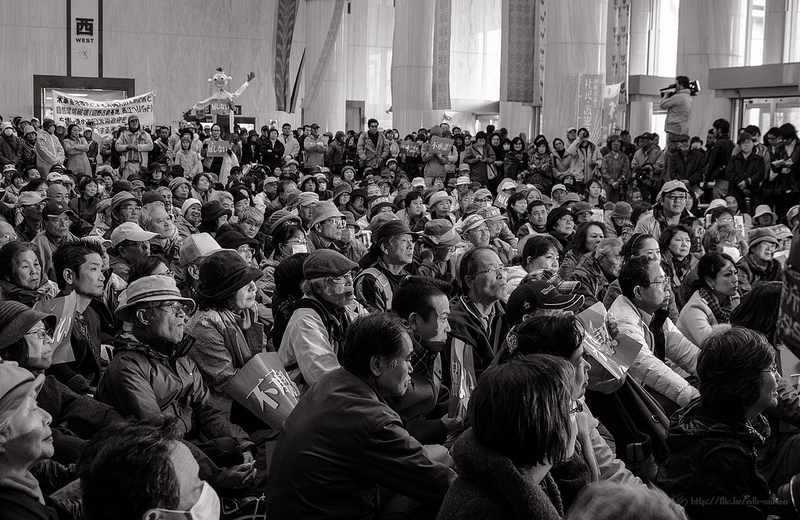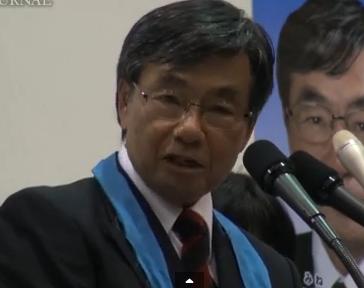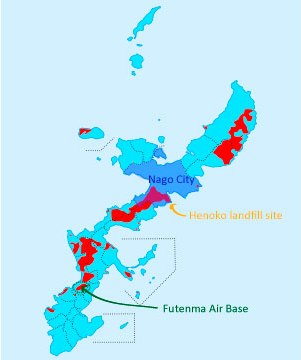 [1]
[1]More than 1,000 people came to the prefecture office of Okinawa to show their opposition to the governor's decision. Photo taken on December 27, 2013 by Ojo de Cineasta (CC BY NC ND 2.0)
The election results of a small city in Okinawa, Japan's southernmost prefecture, are stirring up a national debate over plans to relocate a US military base to Okinawa.
Susumu Inamine, the mayor of Nago city who opposes a plan to transfer the US airbase from Futenma, a populous part of central Okinawa, to Henoko district, a coastal area of Nago, was re-elected on January 20, 2014 with 19,839 vote [2]. Susumu beat out pro-base challenger Bunshin Suematsu, who was backed by the central government which maintains that building a new facility would benefit local economy via government subsidy.

Susumu Inamine spoke in front of his supporters on January 8 2014 during his re-election campaign. Screenshot from Independent Web Journal [3] [ja].
A heavy US presence in Okinawa
When it comes to American military presence, Okinawa prefecture is at the forefront of the debate. According to Japan's Ministry of Defense, Okinawa prefecture make up 74 percent [5] [ja] of the American military presence in Japan, whereas the prefecture constitutes only 0.6 percent of the country's landmass.
The issue at the heart of the mayoral election was a plan that originated 17 years ago: the US and Japanese governments’ suggestion of building a base in Henoko as a replacement for the current Marine Corps air station at Futenma. Just last month on December 27, 2013, Okinawa Governor Hirokazu Nakaima finally approved the relocation plan, putting an end to prolonged impasse to return the Futenma site to Japan.
The presence of US military there goes back to World War II. Award-wining documentary filmmaker John Junkerman explained [6] in an interview with Amy Goodman of news program Democracy Now!:
Nearly 70 years ago the United States took over the Japanese island of Okinawa after one of the bloodiest battles of World War II. More than 200,000 people died, mostly Japanese civilians. Today the United States operates 34 bases on the island and is planning to build a new state-of-the-art Marine base, despite mass protests. A multi-decade movement of Okinawa residents has pushed for ousting U.S. forces off the island, citing environmental concerns and sexual assaults by U.S. soldiers on local residents.
The people of Okinawa generally do not live with explicit aversion to the presence of US forces. As their economy relies heavily on the presence of American troops, the overall relationship is friendly. However, aircraft noise, fires caused by live ammunition exercises in the forest, occasional helicopters crashes, and cases of rapes are problems that greatly concern residents.

Areas colored in red represents base in Okinawa [7] [ja]. The relocation plans to move the Futenma Air Base [pointed in Green] to Henoko, coastal area [pointed in orange] of Nago City [blue]. Image made by Keiko Tanaka using the image from Misakubo on Wikipedia [8]. GNU
Environmental concerns
This relocation plan – a landfill project to build a new facility in Nago's coastal Henoko, which would construct a runway for existing base Camp Schwab – has long been met with fierce opposition by local residents and environmentalist groups [10]. Environmentalists who oppose the plan fear that the coral-rich ocean of Henoko would be damaged by the landfill and the area's endangered population of dugong, a large marine mammal similar in appearance to a manatee, would be affected. The Association to Protect the Northernmost Dugong wrote [11] in a petition campaign on change.org that the environmental assessment is turning into an inconvenient truth:
The Governor has already expressed grave concerns regarding the environmental assessment and impact on the welfare of local residents. In response, the Defense Bureau has simply maintained its assertion that the dugongs would not be affected.
But on September 22, Kyodo News broke the story that the Defense Bureau had actively hidden important facts about dugong activity in Henoko waters uncovered during its environmental assessment. Dugong feeding traces had been found in the waters off Henoko through April to June last year and a dugong was sighted in Oura Bay, adjacent to the Henoko beach. It’s clear that for the Defense Bureau, those findings constituted ‘inconvenient truths’ better hidden from the public.
Anti-base movement in Okinawa
Other anti-base Okinawans do not wish to have additional military facility. So when the governor finally made the decision to accept the proposal by the central government, protesters who once dreamed of the base's relocation outside Okinawa, what was originally put forth by the governor, felt betrayed.
The win by anti-base Nago city mayor Susumu came as an upsetting disruption for Prime Minister Abe and Governor Nakaima's plan to relocate the base from Futennma. According to newspaper Japan Times, Susumu said “the plan must go back to square one” and that he will reject all procedures related to the landfill project.
According to a poll taken in December 2013 by Asahi Shimbun in cooperation with Okinawa's local newspapers and broadcaster, 64 percent of people in Okinawa are opposed [12] [ja] to the governor's approval of the relocation of Futenma base to Henoko. But an online poll conducted by Yahoo! Japan found an even higher 80 percent considered [13] [ja] that the governor's approval was an appropriate move. It's not clear whether one of these polls is more accurate than the other when it comes to the opinions of the people in Okinawa, but the sentiments among Okinawans seem different [14][ja] than those of other Japanese living elsewhere.
A blogger and tour guide living in Futenma for more than 30 years expressed [15] [ja] mixed feelings about the election turnout:
現市長が当選したことで、この500億円の北部振興策のためのお金は白紙に戻ったそうな。
・・・500億円は沖縄へ恩返しのつもりだったと言っていたのですが・・・。
だったら今までの敗戦後の基地がこの沖縄に残り続けていることに対しての恩返しをするべきではないでしょうか・・・。
すごく長い歴史で色んな方たちが傷つきました。この空の上に飛行機が行き交う事がなかなか想像できません。
逆に普天間であんなものを見て、うるさいところにいるから、こんな静かな場所に行きたいな~っていう気持ちにもなります。
だけど、もし辺野古に基地がいったら・・・大騒音をまき散らすことになります。
うるさいけどきれいな場所っていうことになるから・・・私は今後ここに観光ルートで訪れることが・・・なくなるかもしれません。
[中略]…やっぱり沖縄の方たちはこの自然を守ろうとそして子供や孫を守ろうとしている、こんなお金で解決なんてのは
ダメなんだよ~って言っている気がします・・・。
Now that Nago city's mayor was re-elected, the subsidy of 500 million US dollars [50 billion Japanese yen] funding for north Okinawa has gone back to square one.
…while the governor was insisting that the 50 billion Japanese yen was meant to be requital for Okinawa…
If so, shouldn't he be working to return something else…the land of Okinawa where the base remained after the war?
In the long run, many people were hurt. I can't imagine another sky filled with aircraft.
Because I live in Futenma, and see things, and hear noises, it makes me feel like going to some other quiet places.
But if the base moves to Henoko, they will suffer from noise.
It will make Henoko a noisy, yet beautiful place; I might not bring tourists to this area [an island across coastal Nago] anymore
[…] It reminds me that people in Okinawa, who are trying to protect nature and children and grandchildren, are saying no to a solution via money.
The post was sub-edited by L. Finch [16]